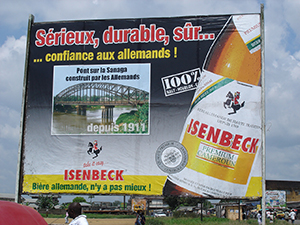Warsteiner in joint venture with Groupe Castel
One way to conceal defeat: join your opponent. That’s what Germany’s Warsteiner brewery has done. Failing to get its Cameroonian brewery off the ground, the privately owned Warsteiner brewery decided to form a joint venture with its competitor Groupe Castel, whose Cameroonian subsidiary controls almost 80 percent of the domestic beer market.
What a year it was for SIAC Isenbeck, Warsteiner’s Cameroonian subsidiary: First their German General Manager does a runner on them, then they have to discover that his bookkeeping has been more than just creative, but not enough, no one wanted to take the blame for the mess they have got themselves into. So who had to fall into his sword? Warsteiner’s charismatic leader supremo, Dr Gustavo Möller-Hergt. He was given the sack last August over somewhat spurious allegations and to this day is fighting his former employer in the courts for unfair dismissal.
With Dr Möller-Hergt gone, all Albert Cramer, Warsteiner’s owner, could think of was to send the octogenarian Joachim Haase to Cameroon to sort things out. Mr Haase had probably been given the brief: “get rid of it all. And quick.” Apart from Cameroon, Warsteiner has stakes in a brewery in Nigeria and Gambia. Together they have a capacity of more than 700,000 hl, Warsteiner says.
Ten years ago, these African breweries fell into Mr Cramer’s hands when he bought out Brauhaase, Mr Haase’s technical consultancy outfit, which had built and partly owned these breweries.
There are probably several reasons why the three breweries never managed to succeed. But after a decade of them giving him nothing but grief, Mr Cramer must have had enough. Now who would take them off his hands? Enter Pierre Castel, the owner of Groupe Castel. Groupe Castel is a privately owned French beverage group, which is now into wine and beer only, having sold its 60 percent stake in mineral water group Alma in May this year. Groupe Castel owns and runs breweries in several predominantly francophone African countries. Incidentally, Groupe Castel has been in bed with SABMiller since 2001, when following a share swap, SAB acquired a 20 percent stake in Groupe Castel’s beer division, while Castel got a 38 percent stake in SABI Africa, a SAB unit which excludes South Africa.
The joint venture between Castel and Warsteiner which was made public in August is supposed to launch the Warsteiner beer brand in Africa. Yet, it is nothing more than a well-disguised admission of defeat.
The reason Mr Castel was interested in entering this joint venture is that it boosts his Cameroonian market share to slightly over 80 percent, far ahead of Guinness Cameroon at 12 percent. It also provides him – and SABMiller – with an access to the Nigerian market where neither Castel nor SABMiller have any breweries yet. Warsteiner’s brewery in Nigeria has a capacity of about 500,000 hl, but for years has only produced 10,000 hl per month, insiders say.
Insiders also expect Mr Castel to eventually pass the Nigerian brewery on to SABMiller. The South African heavyweight brewer has been eying up the second most important beer market in Africa for years now, always stopping short of an outright acquisition.
Neither Warsteiner nor Groupe Castel disclosed any financial details of their transaction. Which may be an indication that Groupe Castel got Warsteiner’s African interests at a bargain price.
To Mr Haase the latest turn of events must mean a severe blow. After all he and Mr Castel have been competitors for decades. What must have sadden him even more is that Warsteiner also brought his former company, Brauhaase, into the joint venture with Castel.

